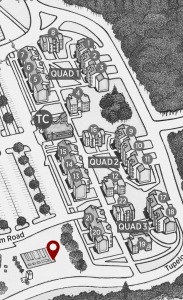- About Ramapo
- Academics
- Admissions & Aid
- Student Life
- Athletics
- Alumni
- Arts & Community
- Quick Links
- Apply
- Visit
- Give
Composting
Ramapo College no longer offers compost at-your-door pick-up service for residents of the College Park Apartments (CPAs) or The Village.
However, we are experimenting with a hybrid and semi-self supported composting program.
For now, if you live in the Village Apartments, and genuinely want to compost your food scraps, we offer to meet you half way.
We’ve set up two food scrap collection bins, blue, at each end of the Village Complex, and near the two recycling centers.
We provide you with small compost pails for your apartment.
When you are ready (don’t wait too long–food scraps can start to smell after a while), lug your pail to one of the blue food scrap collection bins.
We will pay students a relatively small wage to lug the food scraps from the collection bins at each end, to our composting piles by the SSHS/Village garden.
These two nominally paid students–you are welcome to volunteer for future stints–then manage to static compost piles, adding leaves and small wood-chips, turning the pile once a week, and producing rich soil amendments that our landscaping crew can apply to the campus gardens.
The three adjacent compost piles are located beside the fenced in garden, located between the The Village and the Sharp Sustainability Education Center (SSEC).
Understand. This is a limited time Pilot. IF IT PROVES SUCCESSFUL, by the end of the spring semester. If you care to make it permanent, for both the Village and the CPAs, help us prove students DO care. With a little support. We are ALL stretched too thin. But, together, what can we NOT DO?
The Village

Composting 101
ACCEPTED IN COMPOST
![]()
fruit & vegetable scraps*
![]()
bread, grains & nutshells
![]()
coffee grounds & tea bags**
![]()
eggshells, shredded paper*** & chopsticks
*remove any produce stickers | **non-synthetic tea bags only | ***no colored or glossy paper
NOT ACCEPTED IN COMPOST
![]()
cheese or dairy products
![]()
meat, poultry or seafood
![]()
fat, grease or oil
![]()
plastics*
*including biodegradable and compostable plastics
Compost FAQ
What is composting?
Composting is the process of encouraging the decomposition of organic waste—such as food scraps—using microbial processes.
Think of composting as the accelerated process of decomposing organic matter—speeding up the way in which nature itself recycles such matter. When a leaf falls in the forest, it is acted upon by a whole host of creatures, from microorganisms such as bacteria and fungi, as well as worms and insects. When we construct a compost pile—mixtures of organic waste and wood chips or leaf litter—then we are creating the conditions within which decomposers thrive. When the composting process is completed, organic food scraps become transformed into a dark, nutrient rich, crumbly material that can be used to enrich soil.
Adding compost to soil improves soil texture, loosening clay soils, improving them for root growth, while helping light, sandy soils better retain water and nutrients. Compost helps aerate plant roots, while providing essential minerals and nutrients to promote healthy plant growth.
Why compost?
More than 30 percent of garbage is food waste that could have been composted. When you compost, you keep valuable resources out of the landfill and avoid methane emissions that contribute to climate change.
When compost is returned to the soil, it adds nutrients, retains water, increases yields when growing food and stores carbon. Using compost on lawns and gardens also reduces pesticide use, reduces stormwater run-off, and returns important nutrients to the soil so more plants can thrive.
Where should I store my compost bin between collections?
A convenient way to store food scraps (before they are collected to add to the compost pile) is to keep them in the refrigerator or freezer. This method prevents the build-up of mold, foul odors and the attraction of flies or other unwanted pests.
How do I minimize foul odors and attraction of unwanted pests?
Odors and flies will not harm you or the food waste, but they can be a nuisance. Here are some helpful tips to keep them at bay:
- Store your compost in the refrigerator or freezer.
- Use the news! Lining compost bin with newspaper or a paper towel is easy and helps keep your containers clean.
- To reduce odors, sprinkle baking soda in your compost bin.
- Wash your compost bin thoroughly with soap and water after every collection.
Why can’t I put all kinds of food scraps in my compost bin?
At the moment, Ramapo College doesn’t have the infrastructure to accept all kinds of organic materials. Therefore, to prevent disease and odors, certain organic materials, such as animal products, shouldn’t be included in your compost bin.
I am looking to start composting at home. What are some tips to get started?
Here are some links to great resources on home composting:
Copyright ©2025 Ramapo College Of New Jersey. Statements And Policies. Contact Webmaster.

Follow Ramapo Green